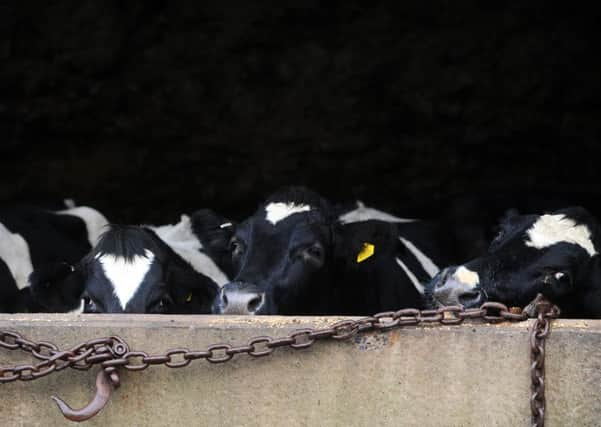Dorothy Fairburn: Price squeeze shows need to buy British


The crisis facing the dairy industry has been well publicised but the volatile state of the farming industry as a whole has not been quite so well reported.
Overall the price index for all crop products was almost five per cent lower in July 2015 compared to the same time last year and 33 per cent down from the peak in May 2013. Similarly, the price index for all animals and animal products was 11 per cent lower in July compared to the previous year.
Advertisement
Hide AdAdvertisement
Hide AdFalling global commodity prices and reduced demand for some products, driven in part by factors such as the ban on agricultural imports to Russia, have had a significant impact on farmers worldwide. Exchange rates have further increased the pressure on UK farm-gate prices, as imports become cheaper and exports find it difficult to compete.
Andrew Robinson, the chairman of the Northern Farming Conference, summed up the problem eloquently when he said: “Usually in agriculture, when one sector has been doing badly at least another sector is doing well, and it isn’t at the moment.”
It is against this backdrop, and then the Government’s response to the floods, that I feel the work of lobbying groups such as the CLA has never been more important. I’m pleased to report some major successes in the past year.
The new Control of Horses Act came into force in May giving landowners greater powers to deal with horses left illegally on their land. The CLA played a key role in driving this legislation through Parliament following its introduction by York Outer MP Julian Sturdy.
Advertisement
Hide AdAdvertisement
Hide AdFarmers and landowners can now take fly-grazed horses to a place of safety immediately. If no owner is identified in four working days, the landowner is free to find the horse a safe new home.
The battle to give farmers more power to convert redundant farm buildings in to homes or work spaces continues. Following sustained pressure from the CLA, the Government published new planning guidance for local councils on how they should interpret permitted development rights.
The new advice clarifies when it is possible to change the use of former agricultural buildings into residential properties, which in turn will help to deliver beneficial economic growth and much needed new homes in rural areas.
The announcements in the Budget marked a milestone in our long-running campaign for a fairer compulsory purchase system, which currently rides roughshod over the rights of private property owners.
Advertisement
Hide AdAdvertisement
Hide AdThe Government is now seriously looking at important solutions tabled by the CLA such as earlier payment of compensation to land and property owners, addressing the miserly interest rates for late payments and taking greater account of business disruption.
Perhaps one of the most significant wins for the CLA in recent times was the Prime Minister’s announcement that the Government will deliver a broadband service of at least 10 megabits to every household by 2020.
The CLA first highlighted poor broadband provision as a barrier to rural business growth more than a decade ago and we are delighted that the Government has finally woken up to this.
Moving in to 2016, there is still plenty of work to be done. One of the simplest ways of giving our farming industry a boost is to encourage shoppers to buy British. There is a strong appetite for home-grown produce with some 85 per cent of consumers saying they would like to see more British food on the shelves.
Advertisement
Hide AdAdvertisement
Hide AdPart of the problem, however, is making sure products carry clear labelling so that shoppers can be confident what they’re buying really is British. Some progress has been made on this front in recent years with the introduction of new regulation but the CLA continues to work with other farming organisations, and support campaigns such as The Yorkshire Post’s Clearly British initiative, to prevent the misleading use of flags and marketing material on products the regulations do not cover.
With a growing world population to feed, the long term outlook for farming and land management is very positive and I look forward to the CLA shaping the policy debate and speaking up for Yorkshire in 2016.
Dorothy Fairburn is the regional chairman of the Country Land and Business Association.